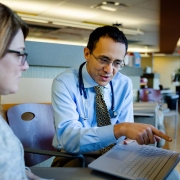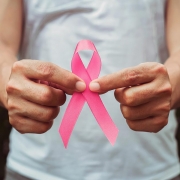The Future of Breast Cancer Treatment
Breast cancer is the second-most common form of cancer in women with 13% expected to develop the disease at some time in their life. Breast cancer can also happen to men — though it makes up for 1% or less of all breast cancer diagnoses.
October marks Breast Cancer Awareness Month, the ideal time to not only remind women about the importance of annual mammograms and self-examinations but to also take a closer look at the progress being made in treatments — all of which are helping breast cancer patients live longer and better lives while offering hope for the future.
Newer, More Effective Treatments
Several new medications have been approved for patients diagnosed with both early and late stages of breast cancer. One such treatment is immunotherapy, which helps the body’s immune system identify and destroy cancer cells.
In clinical trials, immunotherapy has yielded positive results and demonstrated increased response rates in patients with both early and late stages of breast cancer. Immunotherapy is approved for patients with advanced triple-negative cancer, which often grows and spreads faster than other types of breast cancer. Treatment options for triple-negative patients have been limited in the past, making the approval of immunotherapy an exciting breakthrough.
Hormonal therapy, which targets the estrogen receptor, and subsequently, the most common type of breast cancer, can be used before or after surgery, reducing the risk of breast cancer recurrence by approximately 50%. Hormone therapy, either alone or in combination with targeted therapies, is also highly effective in the treatment of late-stage breast cancer.
Targeted therapies are developed when researchers identify what causes a tumor to mutate, such as certain proteins that are present or overproduced in cancer cells compared with healthy cells, and then develop a treatment to stop that mutation. Targeted therapies against the HER2 protein, present in 15%-20% of breast cancers, significantly reduce the risk of breast cancer recurrence and improve overall survival in both early and late stages of disease. Clinical trials demonstrate that targeted therapies significantly reduce the risk of cancer progression and lead to an increased response rate when given in combination with standard therapies or compared with standard therapies.
The Future of Cancer Treatment
Precision medicine refers to treatment based on the genetic understanding of a patient’s disease.
With precision medicine, doctors can use information about a patient’s own genes or tumor mutations to assist with the diagnosis and treatment of cancer. In a patient who has been diagnosed with breast cancer, precision medicine helps to determine whether certain targeted therapies and immunotherapy will be beneficial in their treatment.
Not only can precision medicine help doctors put together very specific plans that often lead to a more accurate diagnosis and more effective cancer treatment, but it can also let a patient know if they are a high risk for developing breast cancer. Having this knowledge allows for a proactive approach to early detection, which includes more frequent and better screening tests.
The Benefits of Community-based Treatment
At Messino Cancer Centers, we use the most up-to-date approved treatments including hormonal-based therapies, chemotherapies, immunotherapies and targeted therapies, and offer patients access to a robust list of clinical-based trials. We have many support services available to our patients including social and behavioral therapy, a cancer-specific dietitian and a care management team. We also offer the DigniCap Cooling System, which has been clinically proven to help prevent hair loss from certain chemotherapy treatments.
Because we are a community-based practice, our patients don’t have to worry about traveling out of the area for treatment and are able to stay close to their support system of family and friends. It also allows our nurses and physicians to create strong, trustful relationships with our patients, who feel less like a number and more like an individual who is truly cared for.
The strong support of a community-based staff coupled with exciting therapeutic treatment advances give breast cancer patients more hope than ever in their quest to live happier, healthier and longer lives.














